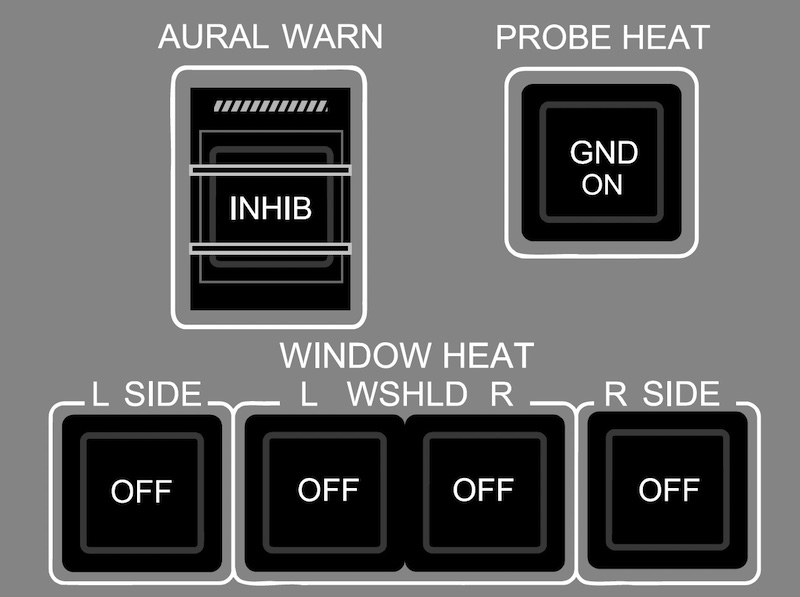The sensing element in the ice detector probe is an electrical oscillator that vibrates at a specific frequency. Ice on the sensing element is detected by a change in the vibration frequency of the oscillator. When ice is detected, the sensing element momentarily heats up to de-ice. The ice detector will continue to indicate icing conditions for _____ after they are detected.
The anti-ice system will then remain on for an additional 2 minutes so that the system does not have to cycle on and off in intermittent icing conditions.
The Cowl Anti-Ice System (CAIS) uses 6th stage engine bleed air to heat the engine cowl leading edge and prevent ice accumulation. The CAIS is inhibited on the ground if:
Rain, snow, and moisture are removed from the windshields by two electrically operated wipers. The maximum operating speed for the windshield wipers is:
PROBE HEAT switch - When pressed in, the GND ON label on the switch comes on in white and the ADSP and TAT probe heaters activate:

The GND ON label on the switch goes off after the 2 minutes delay.
Bleed air from the 4th and 6th stage compressor provides anti-icing for the wing leading edges and engine cowls.
When the WING switch on the ANTI-ICE panel is set to AUTO, wing heat is controlled automatically by:
When ice is detected, the IASCs command both WAIVs to the open position and the ICE advisory message is displayed on the EICAS page.
When the WING switch is set to ON, the ice detection system and the Integrated Air System Controllers (IASCs) command the Wing Anti-Ice Valves (WAIVs) to open when in flight. The WING A/ICE ON status message is displayed on the EICAS page. If ice conditions are anticipated, the WING switch is set to ON. The Wing Anti-Ice System (WAIS) is inhibited on the ground _____ (except for testing).
If the Auxiliary Power Unit (APU) is the source of bleed air when wing anti-icing is required, the Integrated Air System Controllers (IASCs) will:
The Wing Anti-Ice Valves (WAIVs) are installed outboard of the engine nacelles, and are _____.
In normal operation, the onside engine supplies bleed air for anti-icing. In the event of an engine failure or a single bleed source, the cross bleed valve connects both wings to the single bleed source.
When both the left and right WIPER switches are in the same position, the wipers are synchronized.
Advertisement
The Wing Anti−Ice System (WAIS) and Cowl Anti−Ice System (CAIS) status indications are displayed on the:
When the WING switch is set to OFF and ice is detected, the 'ICE' caution message and the 'WING A/ICE OFF' status message are displayed on the EICAS page to indicate a misconfiguration.
The TAT, AOA sensors, and Air Data Smart Probes (ADSPs) probe heaters are automatically selected on when:
The ADSPs, TAT probes, AOA sensors, and P2T2 probes are electrically heated. Each ADSP has a pitot port, static port, and AOA detector combined with an Air Data Computer (ADC). The AOA sensors behind the ADSPs are used as a backup.
When the WING switch is set to OFF and ice is detected, the _____on the EICAS page to indicate a misconfiguration.
Ice and rain protection is provided for the engine cowls, flight deck windshields/side windows, and Air Data System (ADS) probes and sensors and also:
The leading edge, inboard, and outboard slats of the engine do not require anti-icing. Ice accumulation is not considered significant in these areas, even in adverse icing conditions. For the same reason, there is no anti-icing on the vertical and horizontal stabilizers.
Wing Anti-Ice System (WAIS) operation - In icing conditions, the system activates when the altitude reaches _____, whichever occurs first (WING switch set to AUTO).
The P2T2 probes on each engine cowl are electrically heated when the AC power is available.
On each engine cowl, the P2T2 probes (pressure and temperature sensors) are electrically heated when the engine is operating.
The windshields and side windows are electrically heated and the anti-ice system is turned on automatically when:
The flight crew can set each windshield/side window heat to OFF, as necessary. Each heating element is monitored by its own Windshield Ice Protection Controller (WIPC), which is in the forward avionics compartment.
